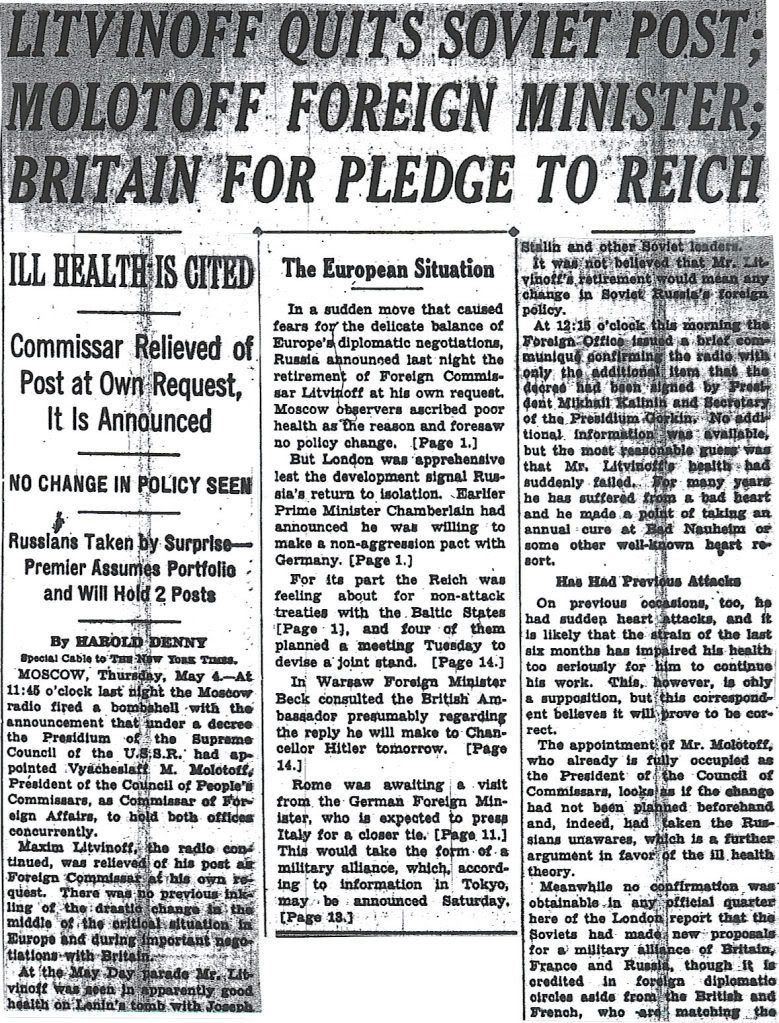
Posted on 05/04/2009 6:03:39 AM PDT by Homer_J_Simpson

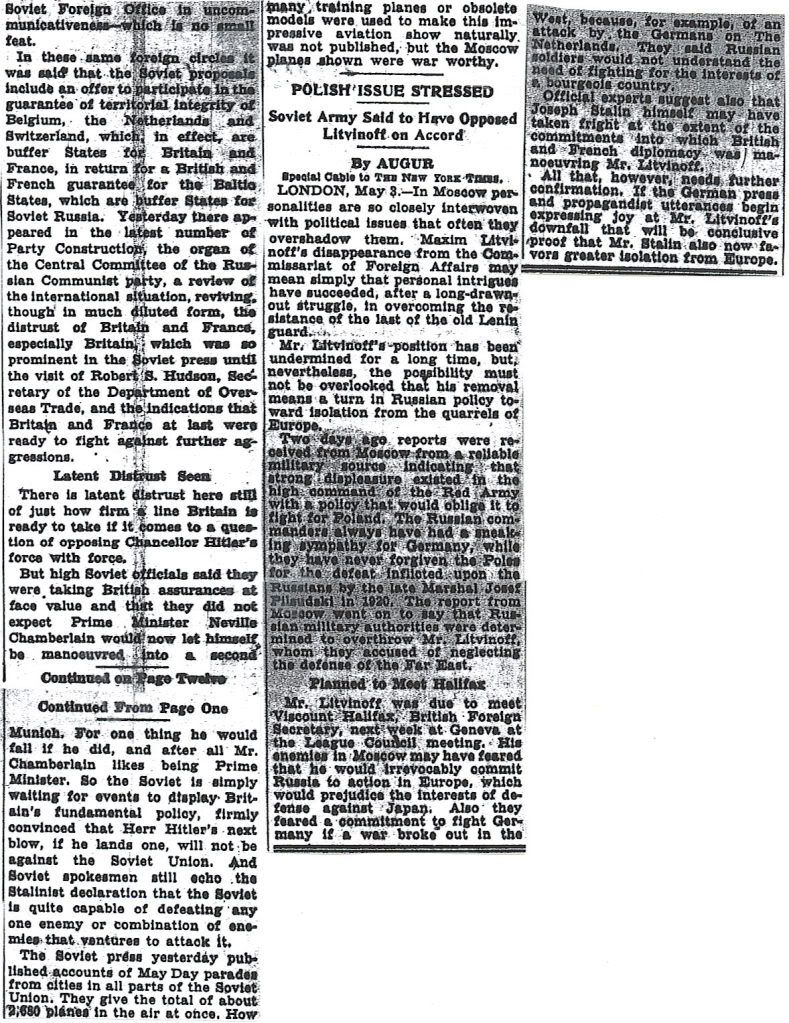
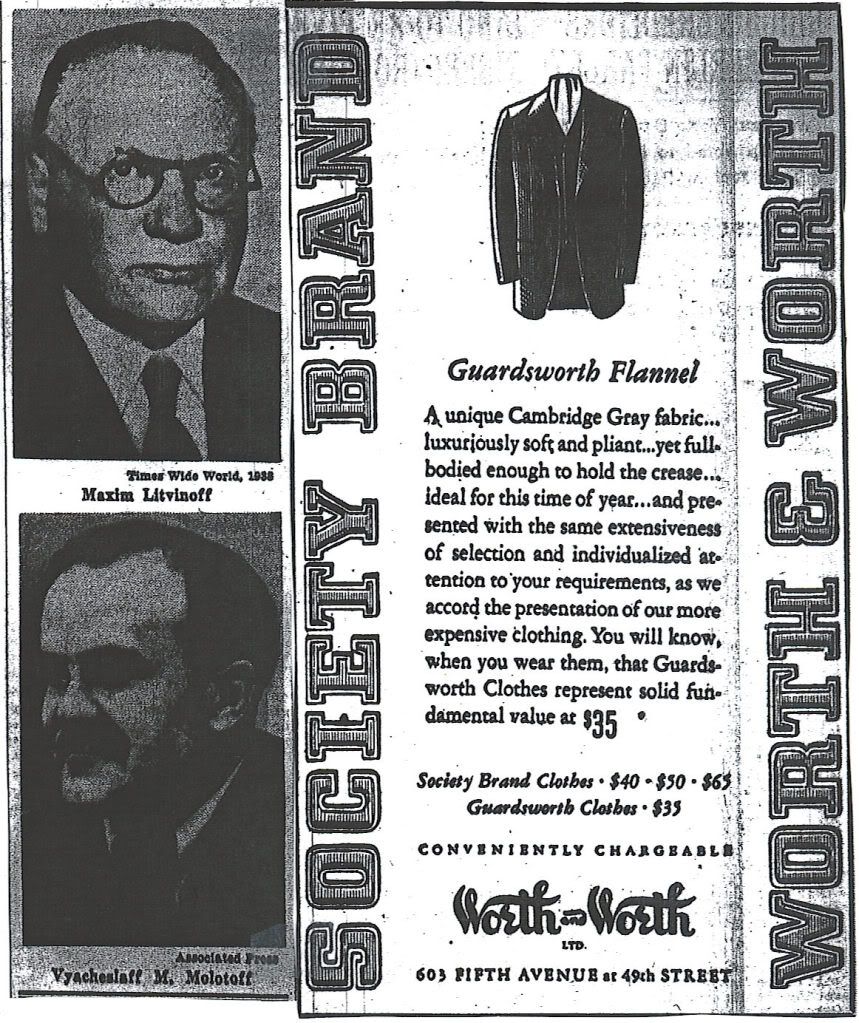
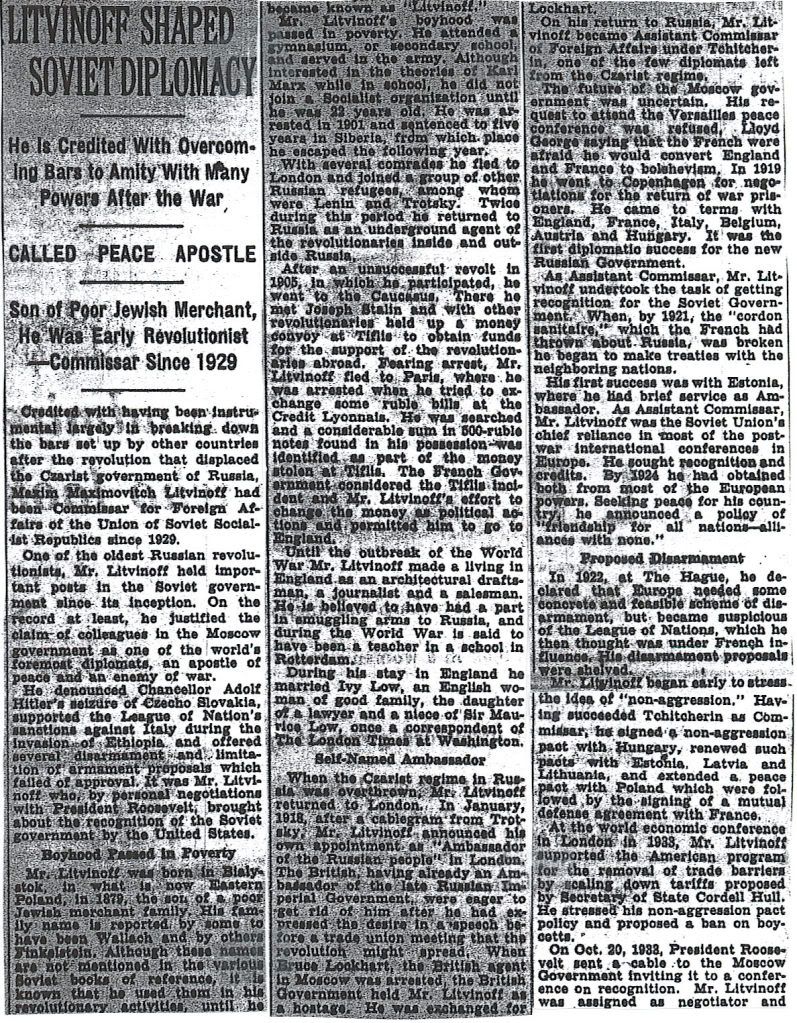
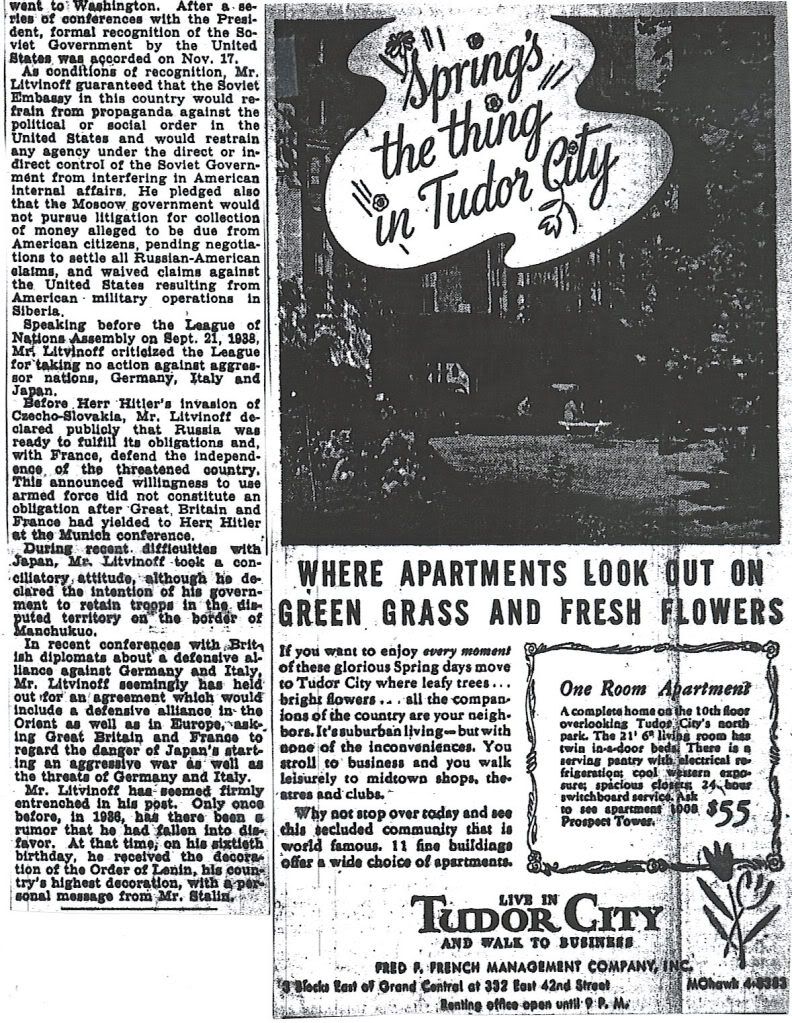
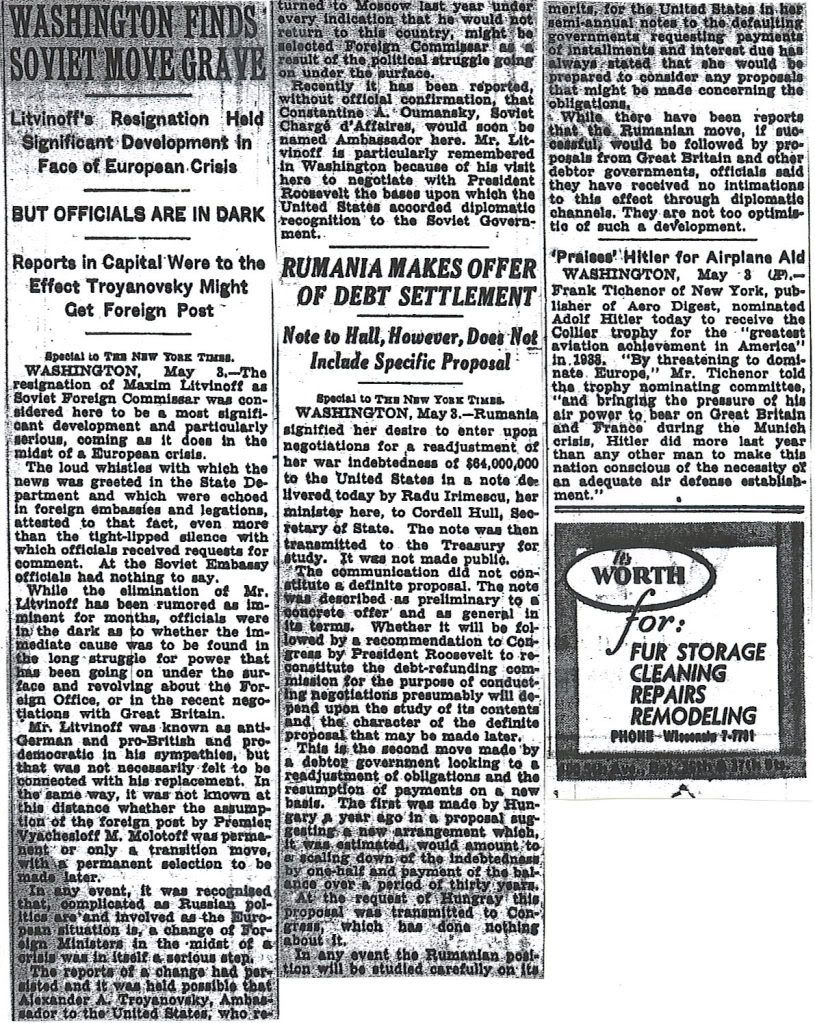
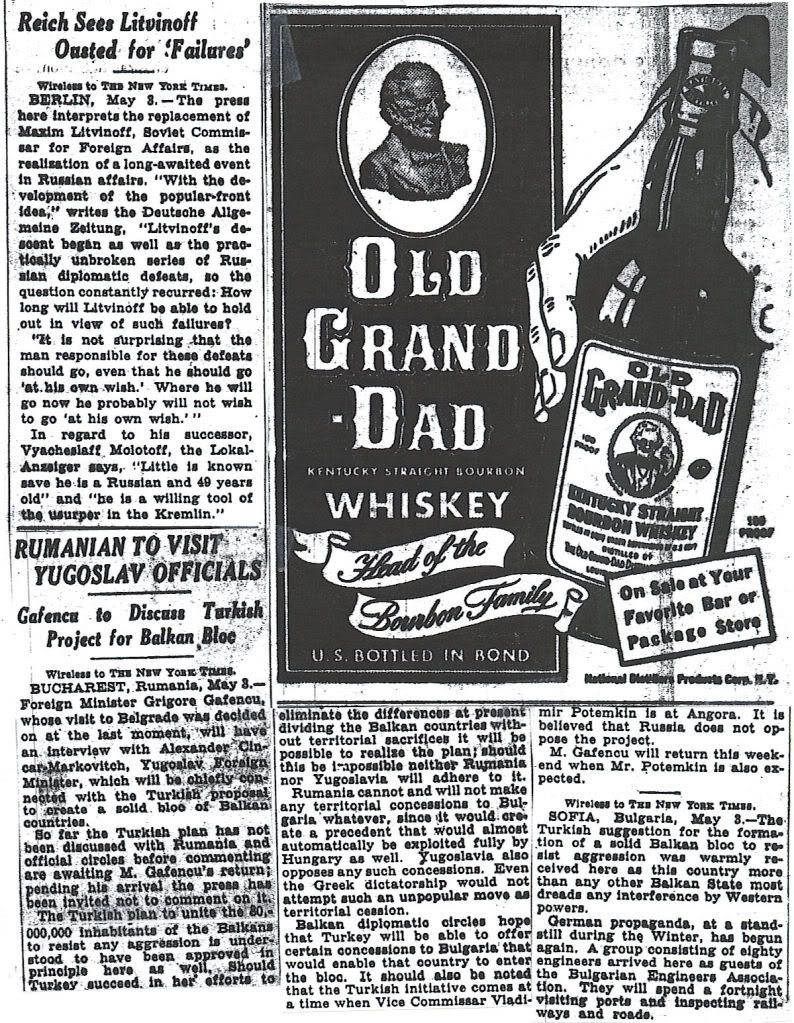
Above all, time must not be lost. Ten or twelve days have already passed since the Russian offer was made. The British people, who have now, at the sacrifice of honoured, ingrained custom, accepted the principle of compulsory military service, have a right, in conjunction with the French Republic, to call upon Poland not to place obstacles in the way of a common cause. Not only must the full cooperation of Russia be accepted, but the three Baltic States, Lithuania, Latvia, and Esthonia, must also be brought into association. To these three countries of warlike peoples, possessing together armies totalling perhaps twenty divisions of virile troops, a friendly Russia supplying munitions and other aid is essential.
There is no means of maintaining an Eastern front against Nazi aggression without the active aid of Russia. Russian interests are deeply concerned in preventing Herr Hitler's designs on Eastern Europe. It should still be possible to range all the States and peoples from the Baltic to the Black Sea in one solid front against a new outrage or invasion. Such a front, if established in good heart, and with resolute and efficient military arrangements, combined with the strength of the Western Powers, may yet confront Hitler, Gocring, Himmler, Ribbentrop, Goebbels and Co. with forces the German people would be reluctant to challenge.
The German Charge d’Affaires in Moscow reported on May 4 [Regarding the replacement of Litvinov with Molotov] as follows: “Since Litvinov had received the English Ambassador as late as May 2 and had been named in the Press of yesterday as guest of honour at the parade, his dismissal appears to be the result of a spontaneous decision by Stalin. . . . At the last Party Congress Stalin urged caution lest the Soviet Union should be drawn into conflict. Molotov (no Jew) is held to be 'the most intimate friend and closest collaborator of Stalin'. His appointment is apparently the guarantee that the foreign policy will be continued strictly in accordance with Stalin's ideas."
Soviet diplomatic representatives abroad were instructed to inform the Government to which they were accredited that this change meant no alteration in Russian foreign policy, Moscow Radio announced on May 4 that Molotov would carry on the policy of Western security that for years had been Litvinov's aim. The eminent Jew, the target of German antagonism, was flung aside for the time being like a broken tool, and, without being allowed a word of explanation, was bundled off the world stage to obscurity, a pittance, and police supervision. Molotov, little known outside Russia, became Commissar for Foreign Affairs, in the closest confederacy with Stalin. He was free from all encumbrance of previous declarations, free from the League of Nations atmosphere, and able to move in any direction which the self-preservation of Russia might seem to require. There was in fact only one way in which he was now likely to move. He had always been favourable to an arrangement with Hitler. The Soviet Government were convinced by Munich and much else that neither Britain nor France would fight till they were attacked, and would not be much good then. The gathering storm was about to break. Russia must look after herself.
The dismissal of Litvinov marked the end of an epoch. It registered the abandonment by the Kremlin of all faith in a security pact with the Western Powers and in the possibility of organising an Eastern front against Germany. The German Press comments at the time, though not necessarily accurate, are interesting. A dispatch from Warsaw was published in the German newspapers on May 4 stating that Litvinov had resigned after a bitter quarrel with Marshal Voroshilov ("the Party boy", as cheeky and daring Russians called him in moments of relaxation). 'Voroslilov, no doubt on precise instructions, had declared that the Red Army was not prepared to fight for Poland, and, in the name of the Russian General Staff, condemned "excessively far-reaching military obligations". On May 7 the Frankfurter Zeitung was already sufficiently informed to state that Litvinov's resignation was extremely serious for the future of Anglo-French "encirclement", and its probable meaning was that those in Russia concerned with the military burden resulting from it had called a halt to Litvinov. All this was true; but for an interval it was necessary that a veil of deceit should cover the immense transaction, and that even up to the latest moment the Soviet attitude should remain in doubt. Russia must have a move both ways. How else could she drive her bargain with the hated and dreaded Hitler?
The Jew Litvinov was gone, and Hitler's dominant prejudice placated. From that moment the German Government ceased to define its foreign policy as anti-Bolshevism, and turned its abuse upon the "pluto-Democracies". Newspaper articles assured the Soviets that the German Lebensraum did not encroach on Russian territory; that indeed it stopped short of the Russian frontier at all points. Consequently there could be no cause of conflict between Russia and Germany unless the Soviets entered into "encirclement" engagements with England and France. The German Ambassador, Count Schulenburg, who had been summoned to Berlin for lengthy consultations, returned to Moscow with an offer of an advantageous goods-credit on a long-term basis. The movement on both sides was towards a compact.
This violent and unnatural reversal of Russian policy was a transmogrification of which only totalitarian States are capable. Barely two years since the leaders of the Russian Army, Tukhachevsky and several thousands of its most accomplished officers, had been slaughtered for the very inclinations which now became acceptable to the handful of anxious masters in the Kremlin. Then pro-Germanism had been heresy and treason. Now, overnight, it was the policy of the State, and woe was mechanically meted out to any who dared dispute it, and often to those not quick enough on the turn-about.
For the task in hand no one was better fitted or equipped than the new Foreign Commissar.
The figure whom Stalin had now moved to the pulpit of Soviet foreign policy deserves some description, not available to the British or French Governments at the time. Vyacheslav Molotov was a man of outstanding ability and cold-blooded ruthlessness, He had survived the fearful hazards and ordeals to which all the Bolshevik leaders had been subjected in the years of triumphant revolution. He had lived and thrived in a society where ever-varying intrigue was accompanied by the constant menace of personal liquidation. His cannon-ball head, black moustache, and comprehending eyes, his slab face, his verbal adroitness and imperturbable demeanour, were appropriate manifestations of his qualities and skill. He was above all men fitted to be the agent and instrument of the policy of an incalculable machine. I have only met him on equal terms, in parleys where sometimes a strain of humour appeared, or at banquets where he genially proposed a long succession of conventional and meaningless toasts. I have never seen a human being who more perfectly represented the modern conception of a robot. And yet with all this there was an apparently reasonable and keenly-polished diplomatist. What he was to his inferiors I cannot tell. What he was to the Japanese Ambassador during the years when after the Teheran Conference Stalin had promised to attack Japan once the German Army was beaten can be deduced from his recorded conversations. One delicate, searching, awkward interview after another was conducted with perfect poise, impenetrable purpose, and bland, official correctitude. Never a chink was opened. Never a needless jar was made. His smile of Siberian winter, his carefully-measured and often wise words, his affable demeanour, combined to make him the perfect agent of Soviet policy in a deadly world.
Correspondence with him upon disputed matters was always useless, and, if pushed far, ended in lies and insults, of which this work will presently contain some examples. Only once did I seem to get a natural, human reaction. This was in the spring of 1942, when he alighted in Britain on his way back from the United States. We had signed the Anglo-Soviet Treaty, and he was about to make his dangerous flight home. At the garden gate of Downing Street, which we used for secrecy, I gripped his arm and we looked each other in the face. Suddenly he appeared deeply moved. Inside the image there appeared the man. He responded with an equal pressure. Silently we wrung each other's hands. But then we were all together, and it was life or death for the lot. Havoc and ruin had been around him all his days, either impending on himself or dealt by him to others. Certainly in Molotov the Soviet machine had found a capable and in many ways a characteristic representative—always the faithful Party man and Communist disciple. How glad I am at the end of my life not to have had to endure the stresses which he has suffered; better never be born. In the conduct of foreign affairs Mazarin, Talleyrand, Metternich, would welcome him to their company, if there be another world to which Bolsheviks allow themselves to go.
Winston S. Churchill, The Gathering Storm
Litvinov was ousted because he was Jewish, and there was no way Hitler would negotiate with a Jew. Stalin knew that.
And Litvinov was only spared a one-way ticket to the Lubyanka, because he had a British wife.
Frank Tichenor of New York, publisher of Aero Digest, nominated Adolf Hitler today to receive the Collier trophy for the “greatest aviation achievement in America: in 1938. “by threatening to dominate Europe,” Mr. Tichenor told the trophy nominating committee, “ and bringing the pressure of his air power to bear on Great Britain and France during the Munich crises, Hitler did more last year than any other man to make this nation conscious of the necessity of an adequate air defense establishment.”
The lowest rings of h*ll, I'd be pretty certain. And no doubt a HUGE improvement over life under Communism! ;-)
Somehow this made me think that someone should nominate Zero at the NRA convention for encouraging people to buy guns and ammo.
Good parallel. I didn't catch the irony in that filler when I posted it. I wonder if the folks at the NRA are capable of that kind of wit.
Retiring for the summer to his mountain retreat at Berchtesgaden, Hitler did not publicly respond to the Polish answer to him which was given on May 5 in a speech by Colonel Beck to Parliament and in an official government memorandum presented to Germany on that date. The Polish statement and Beck’s speech constituted a dignified, conciliatory but also firm reply.
It is clear [it said] that negotiations, in which one State formulates demands and the other is obliged to accept those demands unaltered, are not negotiations.
William L. Shirer, The Rise and Fall of the Third Reich
Poland update at #9.
bump
No, Stalin didn’t need to execute Litvinov, just bench him in favor of Molotov. Stalin knew he might need to bring Litvinov back into the game later if he needed him, and in fact Litvinov did show up again during the war as the Grand Alliance was forged.
The dismissal of Litvinov was exactly what Stalin intended it to be; he was positioning himself to abandon efforts at working with Britain and France and cut a deal with Hitler. Stalin figured all along that the British and French intended to defeat Hitler at the cost of copious amounts of Russian blood. Instead, through the Non-Aggression Pact, he figured the western allies and Germany would exhaust themselves in a war with each other and he could clean up in the post war settlement at little cost.
As things worked out, Britain, France and Germany were exhausted by WW2, which the USSR won at the cost of copious amounts of Russian blood, and Stalin only partially cleaned up in the post war settlement because the USA took an active role in Europe.
Thank you. I don’t get to post much as I have a lot of deadlines to meet at work right now but I am readin when I can and appreciate your threads.
Disclaimer: Opinions posted on Free Republic are those of the individual posters and do not necessarily represent the opinion of Free Republic or its management. All materials posted herein are protected by copyright law and the exemption for fair use of copyrighted works.